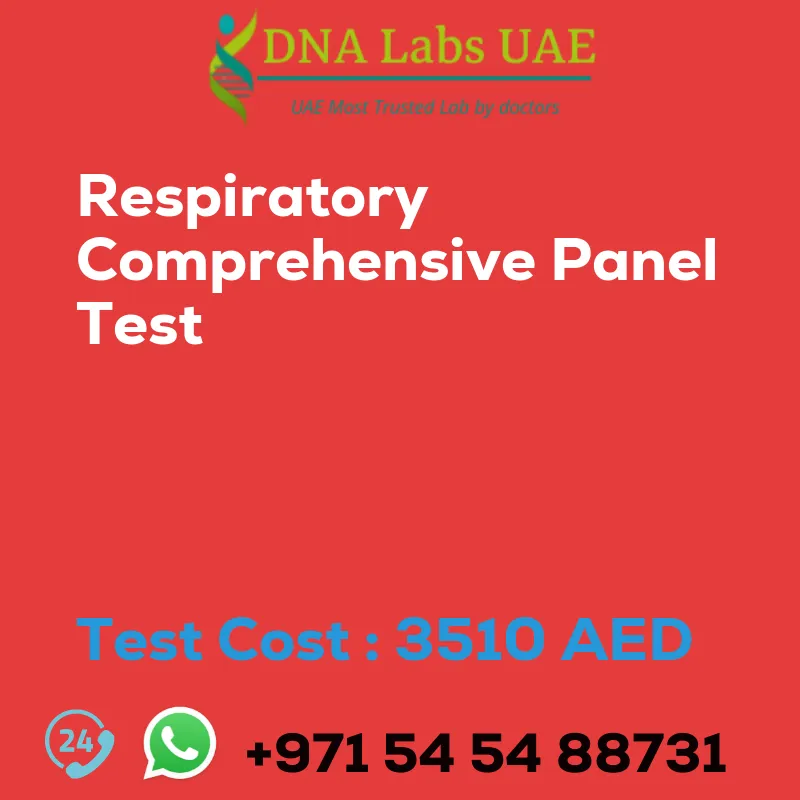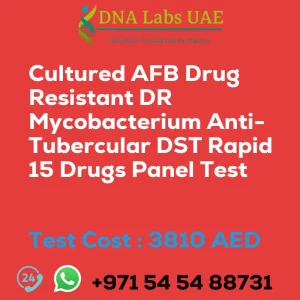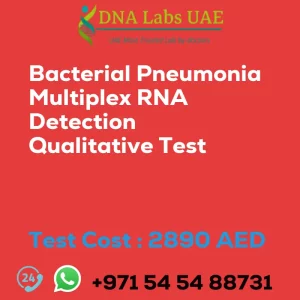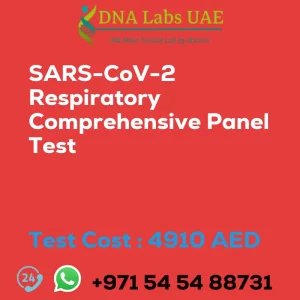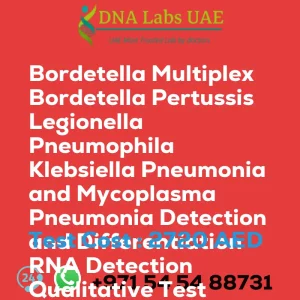RESPIRATORY COMPREHENSIVE PANEL Test
Test Name: RESPIRATORY COMPREHENSIVE PANEL Test
Components: 33 Pathogens – Respiratory Panels 1-8
Price: 3510.0 AED
Sample Condition: Submit Throat / Nasal swabs in special collection medium available from LPL OR 5 mL (3 mL min.) Sputum / Bronchoalveolar lavage fluid in a sterile screw capped container. Ship refrigerated or frozen.
Report Delivery: SampleMon / Wed / Fri by 9 am; Report Tue / Thu / Sat
Method: Real Time PCR
Test type: Infections
Doctor: Physician, Chest Physician
Test Department: MOLECULAR DIAGNOSTICS
Pre Test Information: No special preparation required
Test Details
The Respiratory Comprehensive Panel is a diagnostic test that is used to evaluate respiratory function and detect respiratory infections. It is often ordered when a patient presents with symptoms such as cough, shortness of breath, or fever. The panel typically includes several different tests that can provide information about the respiratory system.
These may include:
- Complete blood count (CBC): This test measures the number of red and white blood cells in the bloodstream. Abnormalities in the CBC can indicate an infection or inflammation in the respiratory system.
- Blood gas analysis: This test measures the levels of oxygen and carbon dioxide in the blood. It can help determine how well the lungs are functioning and if there is any impairment in oxygenation.
- Respiratory viral panel: This test detects the presence of specific viral pathogens that can cause respiratory infections, such as influenza, respiratory syncytial virus (RSV), or adenovirus.
- Respiratory bacterial panel: This test identifies specific bacterial pathogens that can cause respiratory infections, such as Streptococcus pneumoniae or Haemophilus influenzae.
- Mycoplasma and Chlamydia pneumoniae testing: These tests detect the presence of atypical bacteria that can cause respiratory infections, such as Mycoplasma pneumoniae or Chlamydia pneumoniae.
- Inflammatory markers: Tests such as C-reactive protein (CRP) or erythrocyte sedimentation rate (ESR) may be included to measure the level of inflammation in the body. Elevated levels can indicate an infection or inflammation in the respiratory system.
The results of the Respiratory Comprehensive Panel can help healthcare providers determine the cause of respiratory symptoms and guide appropriate treatment. It can also help differentiate between viral and bacterial infections, which can impact treatment decisions such as the use of antibiotics.
| Test Name | RESPIRATORY COMPREHENSIVE PANEL Test |
|---|---|
| Components | 33 Pathogens: *Respiratory Panels 1-8 |
| Price | 3510.0 AED |
| Sample Condition | Submit Throat \/ Nasal swabs in special collection medium available from LPL OR 5 mL (3 mL min.) Sputum \/ Bronchoalveolar lavage fluid in a sterile screw capped container. Ship refrigerated or frozen. |
| Report Delivery | SampleMon / Wed / Fri by 9 am; Report Tue / Thu / Sat |
| Method | Real Time PCR |
| Test type | Infections |
| Doctor | Physician, Chest Physician |
| Test Department: | MOLECULAR DIAGNOSTICS |
| Pre Test Information | No special preparation required |
| Test Details |
The Respiratory Comprehensive Panel is a diagnostic test that is used to evaluate respiratory function and detect respiratory infections. It is often ordered when a patient presents with symptoms such as cough, shortness of breath, or fever. The panel typically includes several different tests that can provide information about the respiratory system. These may include: 1. Complete blood count (CBC): This test measures the number of red and white blood cells in the bloodstream. Abnormalities in the CBC can indicate an infection or inflammation in the respiratory system. 2. Blood gas analysis: This test measures the levels of oxygen and carbon dioxide in the blood. It can help determine how well the lungs are functioning and if there is any impairment in oxygenation. 3. Respiratory viral panel: This test detects the presence of specific viral pathogens that can cause respiratory infections, such as influenza, respiratory syncytial virus (RSV), or adenovirus. 4. Respiratory bacterial panel: This test identifies specific bacterial pathogens that can cause respiratory infections, such as Streptococcus pneumoniae or Haemophilus influenzae. 5. Mycoplasma and Chlamydia pneumoniae testing: These tests detect the presence of atypical bacteria that can cause respiratory infections, such as Mycoplasma pneumoniae or Chlamydia pneumoniae. 6. Inflammatory markers: Tests such as C-reactive protein (CRP) or erythrocyte sedimentation rate (ESR) may be included to measure the level of inflammation in the body. Elevated levels can indicate an infection or inflammation in the respiratory system. The results of the Respiratory Comprehensive Panel can help healthcare providers determine the cause of respiratory symptoms and guide appropriate treatment. It can also help differentiate between viral and bacterial infections, which can impact treatment decisions such as the use of antibiotics. |

